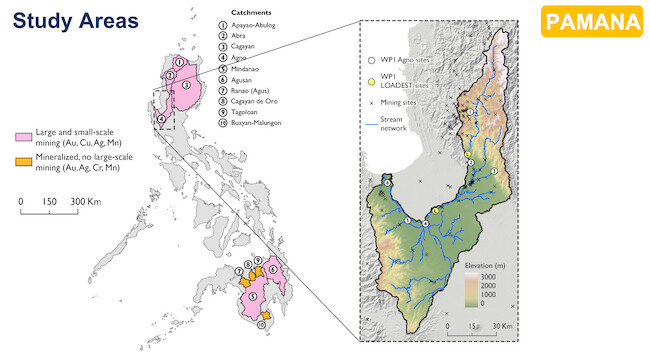Researchers from the University of Glasgow are leading a new project to develop new approaches to sustainable mining in the Philippines.
The three-year PAMANA project, worth £1.5m, is co-funded by the UK Natural Environmental Research Council and the Philippines Department of Science and Technology.
Pamana is a Filipino word, meaning ‘legacy’ or ‘heritage’. The project aims to provide a holistic understanding of the legacy, present and future environmental and ecological impacts of mining on Philippine river systems.
Their project will result in development of a catchment-based approach in developing policies and strategies to manage mineralised watersheds.


PAMANA is a major international collaboration between the University of Glasgow, Liverpool John Moores University, the University of Hull, University of Exeter, Brunel University London and four Philippine universities.
Global targets for a net zero carbon economy hang on the development of clean energy technologies including wind, solar and electric power that are far more complex than traditional hydrocarbon-based technologies.
For example, a typical electric car requires six times more mineral resources than a conventional car, and an onshore wind plant requires nine times more mineral resources than a gas-fired power plant.
This ‘clean energy transition’ is set to triple global demand for so-called ‘technology critical minerals’ by 2040. However, mining these minerals has an enormous carbon footprint and historical mining has given rise to a variety of environmental and social issues worldwide.
The Philippines, for example, has globally significant deposits of technology critical minerals. A nine-year national moratorium on new mining activities was lifted in April 2021.
This development has heightened interest in how new mining projects can be undertaken more sustainably, minimising environmental impacts while supplying the mineral resources critical to meeting global net-zero targets and mitigating climate change.
Dr Richard Williams, senior lecturer at the School of Geographical and Earth Sciences, is leading the University of Glasgow’s contribution to PAMANA.
Dr Decibel Faustino-Eskava at the University of the Philippines Los Banos will lead the Philippines side of the project.
Dr Williams said: “I have been working with partners in the Phillippines on research projects for a number of years now, including flood estimation, fluvial geomorphology characterisation, and geomorphic change.
“PAMANA is an opportunity to apply that knowledge to a critically-important question: how can we extract the resources we need to transition to a net-zero planet in a way that doesn’t contribute to further environmental damage in the process?
“I’m looking forward to doing my part to answer that question alongside the project’s partners in the UK and in the Philippines.”
Dr Enrico Paringit, Executive Director at the Department of Science and Technology at the Philippine Council for Industry, Energy and Emerging Technology (DOST-PCIEERD) said: “The extractive industry remains one of the biggest contributors to the economy in many parts of the world. Through active collaboration, we expect research efforts to shed light on the impacts of mining activities to the environment and find viable solutions and alternatives as we march forward to sustainability goals.”
The ultimate goal of project PAMANA is to enable a new era of sustainable mining in the Philippines by developing practices and policies that empower government agencies, mining companies, scientists, and communities to minimise the environmental and ecological impacts of mining.





































